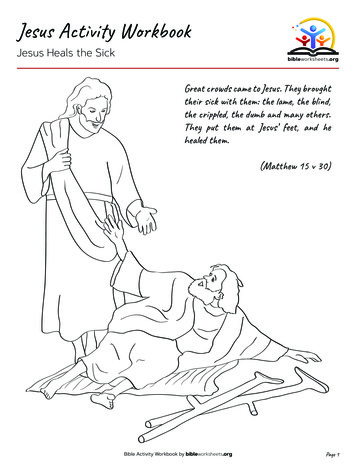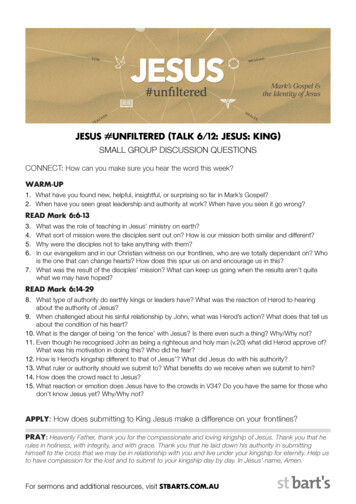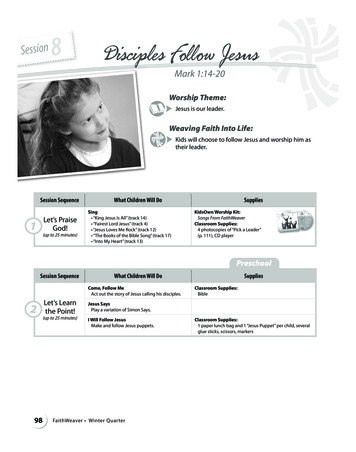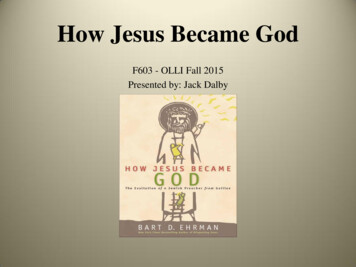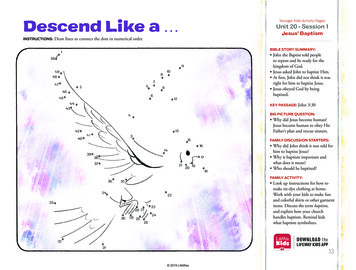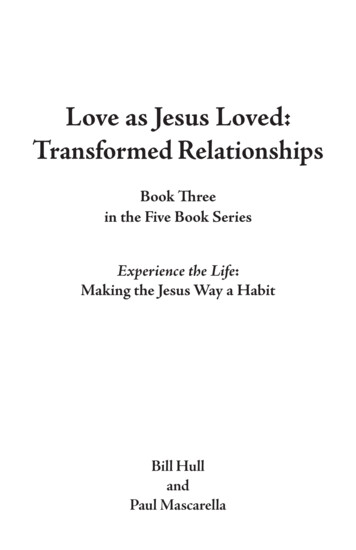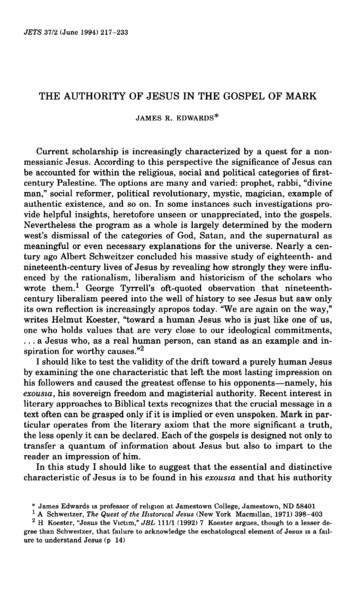
Transcription
JETS 37/2 (June 1994) 217-233THE AUTHORITY OF JESUS IN THE GOSPEL OF MARKJAMES R. EDWARDS*Current scholarship is increasingly characterized by a quest for a nonmessianic Jesus. According to this perspective the significance of Jesus canbe accounted for within the religious, social and political categories of firstcentury Palestine. The options are many and varied: prophet, rabbi, "divineman," social reformer, political revolutionary, mystic, magician, example ofauthentic existence, and so on. In some instances such investigations provide helpful insights, heretofore unseen or unappreciated, into the gospels.Nevertheless the program as a whole is largely determined by the modernwest's dismissal of the categories of God, Satan, and the supernatural asmeaningful or even necessary explanations for the universe. Nearly a century ago Albert Schweitzer concluded his massive study of eighteenth- andnineteenth-century lives of Jesus by revealing how strongly they were influenced by the rationalism, liberalism and historicism of the scholars whowrote them. 1 George Tyrrell's oft-quoted observation that nineteenthcentury liberalism peered into the well of history to see Jesus but saw onlyits own reflection is increasingly apropos today. "We are again on the way,"writes Helmut Koester, "toward a human Jesus who is just like one of us,one who holds values that are very close to our ideological commitments,. . . a Jesus who, as a real human person, can stand as an example and inspiration for worthy causes."2I should like to test the validity of the drift toward a purely human Jesusby examining the one characteristic that left the most lasting impression onhis followers and caused the greatest offense to his opponents—namely, hisexousia, his sovereign freedom and magisterial authority. Recent interest inliterary approaches to Biblical texts recognizes that the crucial message in atext often can be grasped only if it is implied or even unspoken. Mark in particular operates from the literary axiom that the more significant a truth,the less openly it can be declared. Each of the gospels is designed not only totransfer a quantum of information about Jesus but also to impart to thereader an impression of him.In this study I should like to suggest that the essential and distinctivecharacteristic of Jesus is to be found in his exousia and that his authority* James Edwards is professor of religion at Jamestown College, Jamestown, ND 584011A Schweitzer, The Quest of the Historical Jesus (New York Macmillan, 1971) 398-4032H Koester, "Jesus the Victim," JBL 111/1 (1992) 7 Koester argues, though to a lesser degree than Schweitzer, that failure to acknowledge the eschatological element of Jesus is a failure to understand Jesus (p 14)
218JOURNAL OF THE EVANGELICAL THEOLOGICAL SOCIETYis perhaps the most significant example of implicit Christology in the gospeltradition. Specifically I would assert that exousia as used by Mark derivesnot from human origins but from the authority of God that Jesus receivesat his baptism, and that it constitutes the essence of his divine sonship andunique confidence to act in God's behalf.I. THE USE OF EXOUSIAIN THE LXX ANDLITERATURE,INTERTESTAMENTALINCLUDING THE QLExousia occurs late in the LXX, and then largely in Daniel and theMaccabees. Of its nearly ninety occurrences in the LXX, fully half refer tokingship and magistracy. 3 The second largest number refers to God's authority 4 or to surrogates of God, such as priests (1 Esdr 8:22), Jerusalem(Sir 24:11), Israel (Ps 113:2), or the covenant (Sir 45:17). In only nine instances, or in roughly ten percent of its occurrences, is exousia used otherthan of royal or divine authority. In six of these it describes various formsof human authority, 5 twice it is used of nature (Ps 135:8-9), and once it isused of the demonic (Dan 7:6 [Th]).A similar pattern emerges in the Pseudepigrapha. 6 Of twenty-three occurrences of exousia, four refer to royalty (1 Enoch 9:7; T. Abr. [A] 2:11; Ep.Arist 206, 215), and four directly to God (1 Enoch 9:5; 25:4; T. Job 3:6; Ep.Arist. 253). Here too surrogates of God receive authority: In five instancesthey are angels and spiritual powers,7 and once the messianic priest (T. Levi18:12). New, however, is the use of exousia for Satan and demons, 8 which iseven more in evidence at Qumran. Again, only in isolated instances is exousia used of human agency.9 Thus in both the LXX and Pseudepigrapha wefind that exousia shows a strong preference for supernatural authority,whether divine or demonic, or for the investiture of royal authority.The evidence from Qumran generally agrees with the foregoing, althoughthe QL shows a preference for using exousia for the authority of spiritualpowers, both angelic and (more frequently) demonic. Behind exousia in theLXX lies one of two Hebrew or Aramaic terms, mäsal or sälat, which3Forty-four times 2 Kgdms 20 13, 1 Esdr 4 28, 40, Tob 1 21 (S), E s t h 3 13, 8 13, Prov 17 14,Wis 10 14, Isa 39 2, Dan 3 2, 3, 97, 4 31 (S), 34 (S), 37a (S), 37b (S), 37c (S), 5 7 (S), 16 (S), 29(S), 6 4 (S), 7 27 (Th), 28 (S), Bel 25, 1 Mace 1 13, 6 11, 10 6, 8, 32, 35, 38, 11 58, 14 4, 2 Mace3 6, 24, 4 9, 24, 7 16, 10 13, 3 Mace 7 12, 2 1 , 4 Mace 4 5, 5 15, 6 334Eighteen times J d t 8 15, E s t h 4 17, Wis 16 13, Sir 10 4, 17 2, Dan 4 3 (Th), 26 (Th), 27 (S),31 (S [twice]), 5 4 (S), 7 14 (S [thrice]), 14 (Th [twice]), 26 (S), 27 (S)5Tob 2 13 (S), 7 10 (S), Eccl 8 8, Sir 9 13, 30 11, 33 20 With reference to h u m a n s , however,exousia tends to designate exceptional forms of power, e g the right to give a d a u g h t e r in m a r riage (Tob 7 10 [S]) or the power over life itself (Eccl 8 8, Sir 33 20)6According to A -M Denis, Concordance grecque des Pseudepigraphesd'AncienTestament(Louvain-la-Neuve Université catholique de Louvain, 1987) 3 3 9 - 3 4 07Τ Abr (A) 9 8, 13 10, 11, Τ Lem 3 8, 3 Apoc Bar 12 38Τ Job 8 2, 3, 16 2, 4, 20 391 Enoch 98 2, Τ Reub 5 1, Ps Sol 9 4, Ep Arist 102
THE AUTHORITY OF JESUS IN THE GOSPEL OF MARK219occur, according to Charlesworth, some seventy-five times in the DeadSea scrolls. At places the fragmentary condition of the texts makes positiveidentification of the target word or its context impossible, in which case theterm is excluded from consideration. Masai and/or sälat refer frequently toGod's dominion11 and equally often to divine surrogates such as spiritualpowers and angels, 12 or less frequently to the Messiah (4QPB1 1 1.1; 4QpIsa7 3.25), the saints (HQMelch 1 2.9; 1QH 12.23; 1QM 1.5), or the priesthood (1QS 9.7). As expected, the term(s) also appear for the rule of kings(HQTemple 59:15; 59:20; 4QPB1 1 1.1; HQtgJob 32.6), governments (4Q5112 1.9; 1QS 3.17), and the military (1QM 6.2). Frequently, however, mäsaland/or sälat refer to Satan's dominion of evil and darkness, 13 or to "the seekers after smooth things" (4QpN 1 2.5; 3 2.4), the wicked priest (lQpHab8.9), or the Kittim (1QM 1.6). As was the case in the LXX and Pseudepigrapha, the scrolls display a reticence to use mäsal and/or sälat of naturalphenomena or simple human agency.14The foregoing reveals that in the LXX and intertestamental literatureexousia is used predominantly of supernatural powers and authorities,especially of God and God's works, representatives and emissaries. In addition Qumran shows a propensity to use the Hebrew and Aramaic equivalents, mäsal and/or sälat, of the demonic supernatural, especially of Satanand his works and minions. In the LXX, and there primarily in Daniel andMaccabees, exousia is often used for kingship. Kings of course were not onlythe highest form of human rule. In the ancient Near East they were believed to derive their authority from God. Repeatedly in the literature exousia is given by God or a supernatural power to kings, priests, the saints,and so on. It is thus authority from without, conferred rather than innate,official rather than native. 15 The combined evidence allows us to conclude10J Charlesworth, R Whitaker, L Hickerson, S Starbuck and L Stuckenbruck, GraphicConcordance to the Dead Sea Scrolls (Tubingen J C Β Mohr [Paul Siebeck], Louisville Westminster/John Knox, 1991)11Fourteen certain identifications 4Q405 23 1 11, 23 1 12, 1QM 13 10, 4Q510 1 1 2 , 1QH7 23, 13 11, 4Q511 1 1 3, 35 1 8, 1QS 9 24, 10 1, l l t g J o b 9 4, l Q a p G e n 20 13 (twice), 4QAmram2 1312Eleven times 1QM 10 12, 17 7, 4Q405 23 1 8, 1QH 12 9, 1QS 3 20, 4Q511 1 1 1 , 4QAm#ram 1 1 11, 1 1 12, 2 1 5, 2 1 6, 3 1 1 Contrary to Foerster's j u d g m e n t t h a t exousia is not usedof spiritual powers outside th e NT ("exousia," TWNT 2 562, followed by I Broer, "exousia,"TDNT 2 11), these texts (see also η 7 supra) show t h a t th e t e r m could be applied to angelic an dspiritual powers13Twenty#three times, 1QM 1 15, 14 9, 14 10, 17 5, 18 1, 18 11, 1QS 1 18, 1 23, 2 19, 3 2 1 ,3 22, 3 23, 4 19, 4QBer 10 2 8, 4 Q C a t a 2 1 8, 4QM1 8 1 7, 4QM6 3 1 6, CD 12 2, 4Q510 1 1 6 ,4Q511 2 1 3, 10 1 3, 6QBen 2 1 3 , 4QAmram 2 1 1References involve only t h e dominion of t h e sun an d moon (lQ34b 3 2 3) or d a r k n e s s a tnight (1QH 12 6), mortal rule (19 1 1, CD 13 12, l Q a p G e n 22 24), t h e spirit of error (1QH13 15), wisdom sayings or mësalîm ( l Q p H a b 8 6, 4QTestim 1 9) and law (1QM 1 1)15J H Moulton and G Milhgan observe t h a t in the papyri and n o n h t e r a r y texts exousiacarries the sense of a u t h o r i ty conferred by law "hence the common usage in wills, contracts,and other legal documents, to denote the 'claim,' or 'right,' or 'control,' one h a s over anything"(MM 225)
220JOURNAL OF THE EVANGELICAL THEOLOGICAL SOCIETYthat exousia normally was reserved for or derived from supernaturalauthority.I I . T H E AUTHORITY OF J E S U S IN T H E G O S P E L OF M A R K16An overview of the 102 occurrences of exousia in the NT shows that itis used of God, Jesus, and the authority conferred on the Church and/ordisciples by the gospel, but also of Satan, spiritual powers, and variousforms of human authority. Exousia typically resides in or emanates fromGod or the supernatural realm. When it concerns human and earthly powers it generally describes political, religious, or military authorities.In Mark and Matthew exousia is reserved specifically for Jesus or the17apostles. The term is found nine times in Mark—six with reference toJesus (1:22, 27; 2:10; 11:28, 29, 33), twice of the apostles (3:15, 6:7), andonce in the simile of the man who "gave authority over his house to his servants" (13:34), which doubtless is an allusion to the disciples of Jesus. Inthe three instances where Jesus is not the subject, exousia connotes theconferring of his authority on the disciples. 18 Thus every occurrence of exousia in Mark reflects either directly or indirectly the authority of Jesus.1 6Periodical l i t e r a t u r e on t h e authority of J e s u s includes H Anderson, "Jesus Some Aspectsof t h e Question of His Authority," The Social World of Formative Christianity and JudaismFestschrift for H C Kee (ed J Neusner, Philadelphia Fortress, 1988) 290#310, O Betz, "Die Fragenach dem messianischen Bewusstsein Jesu," ΝουΤ 6 (1963) 2 8 # 4 8 , I Broer, "exousia,"TDNT2 9#12, D Daube, "Exousia in Mark 1 22 and 27," JTS 39 (1938) 4 5 # 5 9 , D J Doughty, "The Authority of t h e Son of Man (Mk 2 1#3 6)," ZNW 74/3#4 (1983) 161#181 , J Edwards , "The Baptismof J e s u s According to t h e Gospel of Mark," JETS 34/1 (1991) 4 3 # 5 7 , A Feuillet, "L'exousia duFils du L'Homme," RSR 42 (1954) 161#192, Β Gerhardsson, "Gottes Sohn als Diener GottesMessias, Agape u n d Himmelsherrschaft nach dem M a t t h a u s e v a n g e h u m , " ST 27 (1973) 73#106,Ρ Guillemette, " U n enseignement nouveau, plein d'autorité," NovT 22/3 (1980) 2 2 2 - 2 4 7 ,J Kremer, "Jesu Antwort auf die Frage nach seiner Vollmacht Eine Auslegung von Mk 1 1 , 2 7 33," BibLeb 9 (1968) 128-136, C Marucci, "Die implizite Christologie in der sogennanten Vollmachtsfrage (Mk 11,27-33)," ZKT 108 (1986) 2 9 2 - 3 0 0 , W Osborne, "The M a r k a n Theme of'WhoIs Jesus 7 '," Asia Journal of Theology 3/1 (1989) 3 0 2 - 3 1 4 , R Riesner, "Moderne Jesus-Bilder undder Christus der Evangelien," TBei 22/6 (1991) 3 2 0 - 3 3 1 , F Schmder, "Die Prophetenwirksamkeit J e s u und der Glaube an J e s u s in den Evangelien," BK 38/4 (1983) 1 4 9 - 1 5 3 , L Sabourin,"Il enseignait avec autorité," Studia Missionalia [Spiritual Masters] 36 (1987) 2 5 - 6 3 , Κ Scholt#ìssek, "Nachfolge und Autorität nach dem Markusevangehum, " TTZ 100/1 (1991) 5 6 - 7 4 ,E Schweizer, "Anmerkungen zur Theologie des Markus," NeotestamenticaDeutsche und Englische Aufsatze 1951-1963 (Zürich/Stuttgart Zwingh, 1963) 9 3 - 1 0 4 , G S Shae, "The Questionon t h e Authority of Jesus," NovT 16 (1974) 1-2917The only use of exousia in M a t t h e w a p a r t from J e s u s or t h e apostles concerns a centurionin 8 9 Luke's use of exousia reflects t h e broader p a t t e r n evident in the NT as a whole Beyondthe parallel passages in Mark, Luke uses exousia once of God (12 5), once of t h e apostles(10 19), once of a centurion (7 8//Matt 8 9), twice of t h e devil (4 6, 22 53), and four times of rulers (12 11, 19 17, 20 20, 23 7) Likewise in J o h n , a p a r t from one reference to Pilate (19 10) exousia refers to J e s u s (5 27, 10 18, 17 2), God (19 11), or disciples endowed with God's authority(112)In two instances (3 15, 6 7) t h e disciples are endowed with power to prevail over demonsOn t h e issue of conferring authority fully one-fourth of t h e occurrences of exousia in t h e NT denote its being given by God or Christ to t h e disciples or Church On t h e transfer of Christologîcal authority to ecclesiastical authority see Scholtissek, "Nachfolge" 6 2 - 7 4
THE AUTHORITY OF JESUS IN THE GOSPEL OF MARK2211. UA new teaching—with authority I" (Mark 1:21-28). Mark opensJesus' public ministry in 1:21-28 by establishing his supremacy over thehighest authorities in both the temporal and supernatural realms. Thetemporal realm is represented by the scribes, whose erudition, no lessthan their prestige among the people, was legendary. The scribes stand inthe tradition of the fathers (7:8-13), however, whereas Jesus receives hisauthority directly from the Father (1:11). The scribes derive their authority from Torah, but Jesus appeals to a superior authority resident in himself.19 What is thus essential for Mark, in contrast to Q (which reports thecontent of Jesus' teaching in the sermon on the mount/plain), is not somuch what Jesus taught as who Jesus is as a teacher. 20Even more impressive is Jesus' supremacy in the supernatural realm.Beginning with this story (see also 3:7-12; 5:1-20) the exorcisms in Markpresent the gripping conflict between the kingdom of God and the dominionof Satan, between the One anointed with God's Spirit and those held captive by unclean spirits. The inbreaking of God's kingdom in Jesus first begins, according to Mark, not in the human arena but in the cosmic arena, inorder to bind the "strong man" (3:27) who exercises power over the naturalorder. Indeed, as supernatural powers themselves the demons recognize themission and authority of Jesus before humanity does (1:24; 3:11; 5:7).Nevertheless the encounter is a no-contest event. "What have you to do withus, Jesus of Nazareth? Have you come to destroy us?" cries the demoniac. "Iknow who you are, the Holy One of God" (1:24).21 The pericope concludes19Of the nineteen references to scribes in Mark, all b u t one (12 2 8 - 3 4 ) place t h e m in opposition to J e s u s and his teaching, or in a negative light Daube accounts for t h e i r opposition in1 2 1 - 2 8 by arguing t h a t two classes of scribes h a d developed in J e s u s ' day (1) an inferior classof elementary teachers called sopërîm (grammateis) and (2) a smaller group of elite scribes whotaught with râsût (exousia) J e s u s belonged to t h e l a t t e r group, in Daube's j u d g m e n t , and thisaccounts for the a m a z e m e nt of the crowds in remote Galilee where only t h e lesser scribes wereusually found (Daube, "Exousia") The NT, however, shows no a w a r e n e ss of a class of superscribes nor t h a t J e s u s belonged to it The question of t h e S a n h é d r i n in t h e temple (11 28) indicates t h a t J e s u s presumed an authority quite unknown to the scribes Nor is Daube's a t t e m p tto equate râsût with exousia successful Râsût occurs in only t h r e e fragmentary texts in t h eDead Sea scrolls (1QM 12 4, 4QM1 1 1 3, 4QM1 8 1 6), none of which a p p e a r s to carry t h eforce of mäsal or sälat The authority of t h e T a n n a i m , a t any r a t e , was a temporal a u t h o r i ty according to the Mishna The gospels in fact posit different sources for t h e authority of J e s u s andthe scribes The authority of t h e scribes was derived from Torah and hence a mediated authority J e s u s , however, possessed an immediate authority t h a t was grounded in himself—a factthat did not escape his contemporaries A modern Jewish NT scholar recognizes t h e sameuniqueness in J e s u s He "is t h e only ancient J e w known to us who not only proclaimed t h a t t h eendtime was at h a n d , but at t h e same time t h a t the new time of salvation had already begun"(D Flusser, Jesus [Rowohlts Bildmonographien 140, Reinbek, 1968] 87 102, quoted in Riesner,"Moderne Jesus-Bilder" 328), cf also Scholtissek, "Nachfolge" 590J e s u s is t h e subject of sixteen out of seventeen occurrences of t h e verb didaskem in M a r kand of all eleven uses of the noun didaskalosThus Guillemette "In Mark 1 2 4 - 2 6 J e s u s is notsimply an intermediary, he is God who acts, he is the Holy One of God and the word of J e s u s isat the same time the word of God" ("Un enseignement" 241)It is not unlikely t h a t Mark intends to correlate J e s u s with Samson here J e s u s is identified as the "Nazarene" and "the Holy One of God" as is Samson in J u d g 16 17 (LXX), who inthe A text is called naziraws theou and in the Β text hagios theou J u d g 16 17B is t h e onlyother place in t h e Bible where an individual is called hagios theou (albeit w i t h o u t t h e article)
222JOURNAL OF THE EVANGELICAL THEOLOGICAL SOCIETYwith the astonishment of "everyone" (hapantes): "What is this? A newteaching—and with authority!'" (1:27).22 The cornerstone of Jesus' publicministry is set. In both his word and work Jesus is endowed with the sovereign authority of God.2. The authority to forgive sins (Mark 2:1-12). A further instance ofexousia is found in the healing of the paralytic (2:1-12). Once again Jesusand the scribes run aground, although not, as in 1:21-28, in conflict overlearning or teaching. The issue here is the forgiveness of sins, which according to Jewish tradition was the exclusive prerogative of God.23 Thisprerogative is acknowledged in v. 7: "Who is able to forgive sins exceptGod alone?" The scribes consequently do not claim to forgive sins, andthey are scandalized when Jesus presumes to do so. The scandal is heightened by the fact that, without having been told, Jesus knows what is inthe hearts of the scribes (2:8). Moreover Jesus does not claim to forgivesins against himself (which lay in his prerogative) but against another(2:5, 10). According to Lev 24:16 blasphemy in the name of the Lord ispunishable by death, the very offense of which Jesus is accused in Mark14:63-64. 24 Jesus, according to Mark, knows the crisis in the minds of thescribes—and apparently wills it. The focus in 2:1-12 thus shifts from thephysical paralysis of the lame man to the spiritual paralysis of the scribes.The crux of the story comes in v. 10: "But so that you may know that theSon of Man has authority on earth to forgive sins. . . . " The use of exousiahere contrasts with dynatai in v. 7. There the scribes ask: "Who can forgive sins but God alone?" The shift from to dynatai to exousia means thatthe Son of Man not only has the power but the right to forgive sins. 25 "Theauthority of Jesus has become the central issue. The question here iswhether Jesus exercises divine authority on earth (v. 10), and whethertherefore Jesus stands in the place of God (v. 7c)."26Jesus thus appears to be recognized by the demoniac as one like Samson, powerful and setapart, "who plunders the house of the strong man" (Mark 3 27) See Schweizer, "Er wird Nazoraer heissen," Neotestamentica 51-5522Mark regularly registers the public effect of Jesus' authority by superlatives ekplessö(6 2, 7 37, 10 26, 11 18), thaumazö (5 20, 15 5, 44), ekthaumazö (12 17), thamboumai (1 27,10 24, 32), ekthamboumai (9 15, 16 5), existëmi (2 12, 5 42, 6 51), phoboumai (4 41, 5 15, 33, 36,6 50, 9 32, 10 32, 11 18, 16 8) See C Ε Β Cranfield, The Gospel According to Saint Mark(CGTC, Cambridge Cambridge University, 1985) 7323Exod 34 6#7, Ps 103 3, Isa 43 25, Mie 7 18 There is no evidence that the Messiah wouldhave authority over sins The classical description of the Messiah in Pss Sol 17#18 speaks ofhis righteousness, even sinlessness (17 36), but not of his ability to forgive sins2The fear of blasphemy caused Jews to avoid pronouncing the divine name whenever possible Following Num 15 30, the Mishna decreed expulsion from the community as punishmentfor taking God's name in vain (Ker 1 1#2, Sanh 7 5) The same punishment was decreed atQumran for uttering God's name frivolously (1QS 7)5J D G Dunn says that "it is impossible to soften the Chnstological force of 2 7 and 10Jesus is able and has authority to forgive sins, not merely to declare them forgiven" (Jesus, Paul,and the Law Studies in Mark and Galatians [Louisville Westminster/John Knox, 1990] 27)26Doughty, "Authority" 168 Doughty, however, is mistaken in concluding that Jesus is portrayed here as a "divine man" (thews anër) Some of those who were so designated had healingpowers, but none presumed to forgive sins
THE AUTHORITY OF JESUS IN THE GOSPEL OF MARK223The authority of Jesus is not a theoretical matter for Mark. Jesuswants the scribes to know (v. 10) the truth of which he speaks (v. 9). Hispower to forgive, no less effective because of its invisibility, will be provedby the healing of the paralytic. The power to forgive and the power to healare one. The pronouncement in v. 10 means that the One who has authority to forgive sins in heaven is present in the Son of Man to forgive sins"on earth." 27 The startling result is that Jesus does not here invoke thepower of God—as does Nathan, for instance, who says to David, "The Lordhas put away your sins" (2 Sam 12:13). Rather, Jesus presents himself asone who confidently stands in the place of God. In answer to the question,"Who except God alone?" (v. 7), hearers and readers are invited to supplythe name of Jesus. The exclamation of the crowd gives voice to the uniqueness of the event: "We have never seen anything like this" (2:12). It wasthis very conviction in fact that led the early fathers to the acknowledgment that, in the claim to forgive sins in Mark 2:10 and elsewhere, Jesuswas the Logos of God.283. The authority of Jesus elsewhere in Mark. The foregoing pericopesare typical of a sovereign freedom presupposed and practiced by Jesusthroughout the gospel. In 1:21-28 Jesus first appears as the strong man whobinds Satan and plunders his goods, to use the imagery of 3:27.29 The exercise of his authority encompasses natural forces as well as supernaturalforces, however.30 The descriptions of his exousia over nature are instructivein several of these instances. In the calming of the storm (4:35-41) his "rebuke" of the wind and "muzzling" of the waves are phrased in the languageof exorcism, recalling the power of God over chaos at creation. Both episodesare effected solely by the word. Likewise Jesus' walking on the water (6:4552; connotes that Jesus treads where only God can walk 31 and designatesJesus by the same expression {egö eimi) that is used for God's self-disclosureto Moses (Exod 3:14 LXX).7No attempt is made here to discuss the complex issues associated with the term Son ofMan except to note the relationship between Son of Man and exousia, which was already established in Dan 7 13-14 "Then came one like a son of manAnd to him was given dominion(LXX exousia) and glory and kingdom " Contrary to A Farrer (A Study in Mark [London Dacre, 1951] 271), Son of Man and exousia are not synonymous in Mark, for nowhere are peopleamazed that Jesus calls himself the Son of Man, nor do his opponents take exception to his doing so They are amazed, however, at Jesus' authority, which evidently surpassed anything expected of the Son of Man Doughty correctly observes "The issue for Mark is not whether Jesusis rightly regarded as the Son of Man, but whether, as Son of Man, Jesus has divine authorityon earth" ("Authority" 179)28Iren Haer 5 17 3, Clem Paed 12 6 1 See J Pelikan, The Emergence of the Catholic Tradition (100-600) The Christian Tradition (Chicago University of Chicago, 1971) 1 15529Further instances of Jesus prevailing over the demonic occur in 1 34, 39, 3 11, 15, 5 1-20,6 7, 13, 9 14-2930Calming a storm, 4 35-41, feeding the five thousand, 6 30-44, walking on the water,6 45-52, feeding the four thousand, 8 1-10, withering the fig tree, 11 12-21, and (presumably)darkness at the crucifixion, 15 3331God alone can walk on the waves Job 9 8, 11 (cf Ps 77 19, Isa 43 16)
224JOURNAL OF THE EVANGELICAL THEOLOGICAL SOCIETYFurther evidence of authority over nature is seen in the ability to cureillness. By all accounts Jesus performed miracles of healing, 32 all of whichin Mark appear prior to the triumphal entry in chap. 11. To a lesser extent, of course, there are reports of miraculous healings in the HB as wellas in rabbinic circles and Hellenistic wonder-workers, including a few Roman emperors. Jesus' healing power is not the result of magic or an aberration of nature, however, but rather is in character in the sense that itflows from the same source as his authority to forgive sins (2:1-12), exorcise demons (9:14-29) and master the forces of nature (4:35-41).The exousia of Jesus also comes to expression in social relations. Of firstconcern is the calling of disciples, which inaugurates the mission of Jesus inMark (1:16-20). The importance of the new community is signified by itsnumber, which corresponds to the twelve tribes of Israel. Evidence from thefirst century indicates that as a rule Jewish rabbis were chosen by their students and hence did not call disciples. But from a mountaintop, an imageryreminiscent of Yahweh's summons to Moses on Mount Sinai (Exod 19:20),Jesus sovereignly summons the Twelve into a new community (Mark 3:1319) and to a mission that is founded on a relationship with himself ("in order that they might be with him," v. 14). He confers his authority on theTwelve and sends them out with dominion over demons (6:7-13) and withfreedom from the tradition of the elders (7:5-13).Further instances of Jesus' exousia are seen in the reordering of socialrelationships. The responsibility of a son to provide for his parents is declared to supersede the legal option of Corban (7:8-13). Motherhood andsibling relations are redefined according to doing the will of God ratherthan blood lineage (3:31-35; 6:1-6). In contrast to the tradition of the elders Jesus embraces the alienated of the Mosaic and rabbinic tradition: aleper (1:40-45), tax collectors and sinners (2:13-17), and even uncleanGentiles, including a Syrophoenician woman (7:24-30).Jesus' exousia also manifests itself in the political realm. This is mostevident in Luke, which alone of the gospels records two rebuffs of HerodAntipas, Jesus' political sovereign in Galilee (Luke 13:31-32; 23:6-12).Yet even in Mark, which derives from a Roman provenance either duringor within memory of Nero's outrages against Christians (and because ofwhich its author must exercise discretion in political pronouncements),Jesus declares what is—and what is not—due to Caesar (12:13-17).Equally illustrative is Jesus' silence in the face of Pilate's interrogation(15:1-6), whose inscription on Jesus' cross, "The king of the Jews" (15:28),may express the prefect's pique.Above all, however, the exousia of Jesus manifests itself vis-à-vis therabbinic tradition, the religious hierarchy, and the temple tradition. Foremost here is Jesus' reinterpretation of the Sabbath: "The Sabbath wasJesus' ability as a wonder-worker was acknowledged by his enemies, although it was attributed to Satan rather than to God (Mark 3 22) The same judgment would be preserved centuries later in the Talmud (6 Sabb 104b, y Sanh 25d) See R Τ Herford, Christianity inTalmud and Midrash (London Williams and Norgate, 1903) 112#115
THE AUTHORITY OF JESUS IN THE GOSPEL OF MARK225made for humankind and not humankind for the Sabbath; so the Son ofMan is Lord even of the Sabbath" (2:27-28). The establishment of the Sabbath was the crowning act of creation (Gen 2:1-3), succeeding even thecreation of humanity. Sabbath observance, therefore, is incumbent on Israel as a constitutive order of creation. Hence the Sabbath ordinance is thelongest and most pivotal in the Deuteronomic version of the Decalogue.33Alone of all the nations Israel had been given the Sabbath, and Sabbathobservance sanctified Israel in God's sight (Jub. 2:17-33). Thus whenJesus as Son of Man declares himself to be master of the Sabbath—andeven violates its ordinances by plucking grain (Mark 2:23-26) and healingon the Sabbath (1:21-28; 3:1-6)—he presumes the very authority bywhich the Sabbath was instituted by the Creator.This sovereign disposition toward the Sabbath is typical of Jesus' challenges to the rabbinic tradition as a whole. Such challenges are found primarily at the outset and conclusion of Mark, as if to signify that frombeginning to end the antidote to the "leaven of the Pharisees" (8:15) is theexousia of Jesus. He violates laws of purity by touching and cleansing a leper(1:40-45) and by association with sinners and tax collectors (2:13-17). Heplaces i
find that exousia shows a strong preference for supernatural authority, whether divine or demonic, or for the investiture of royal authority. The evidence from Qumran generally agrees with the foregoing, although the QL shows a preference for using exousia for the authority of spir

